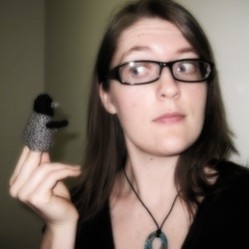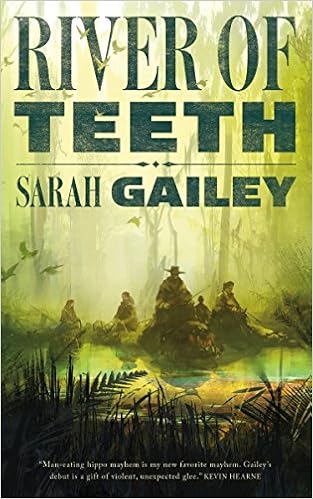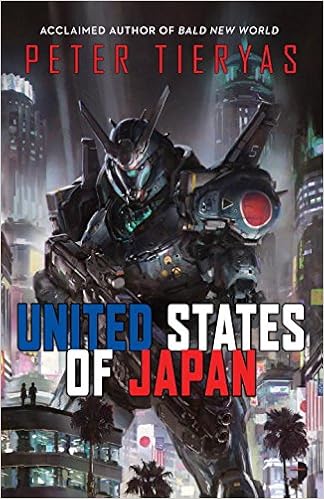interviewed by Carl Slaughter
 Literary agent Amy Boggs is a sci-fi/fantasy geek who has been professionally geeking out over books at Donald Maass agency since 2009. She specializes in speculative fiction and is especially interested in high fantasy, urban fantasy, steampunk (and its variations), YA, MG, and alternate history.
Literary agent Amy Boggs is a sci-fi/fantasy geek who has been professionally geeking out over books at Donald Maass agency since 2009. She specializes in speculative fiction and is especially interested in high fantasy, urban fantasy, steampunk (and its variations), YA, MG, and alternate history.
Her recent books include: Tom Pollock’s Our Lady of the Streets, the final book in the Skyscraper Throne series (urban fantasy); Thea Harrison’s Knight’s Honor, book #7 in the Elder Races series (paranormal romance); Jacey Bedford’s Empire of Dust, the first in space opera series.
CARL SLAUGHTER: Why get into agenting? Rather than writing or editing, or marketing or publicity, or publishing.
AMY BOGGS: I knew I wanted to get into the agenting side of the business after interning at an agency my sophomore year at college. Right out of college, I would have been very happy to have a job that touched publishing in any way, so I could have spent time in any division of a publishing house, but I knew agenting was my end goal because it combines many of my favorite things about the book business. You brainstorm with your authors and help them revise and negotiate fair contracts and fight bad covers and talk them into good covers they don’t particularly like and tell everyone you can about their fabulous books. I work solely for the author, because what benefits the author benefits the agency and me. I like that my job is purely championing my authors and their work.
How did you know as early as college that you wanted to be a literary agent?
Vassar College’s Career Development Office had a weekly newsletter they left in our mailboxes, and one day there was a notice for an internship at a literary agency. I had a vague idea of what agents did and thought it would be good experience. Once I got on the job, I knew it was what I wanted to do in my future.
How did you rise from intern to agent so quickly?
Did I? I think agent careers reflect author careers in that you can’t really say there is a typical timeline they’re supposed to follow. This varies by the agency, of course, but I did my first agency internship in 2005 and then interned at DMLA in 2008 (with jobs at two magazines in between) and then was hired as an agency assistant in 2009. Eight months later I found a brilliant author in my boss’s queries and he thought I should be the one to take him on. Two months later I signed my next client, and five months later I sold a three-book deal. I don’t know if that’s quick or slow or typical, but it happened very organically. I do know that I’m fortunate to work at an agency that encouraged my growth and has a few decades of experience to back me up.
Why so keen on sci-fi/fantasy?
I’ve always loved it. When I was three, I was obsessed with Scooby-Doo. Bruce Coville was my childhood. My pre-teen self couldn’t get enough of Unsolved Mysteries, but only the segments with aliens, UFOs, ghosts, and supernatural critters. The Princess Bride was my family’s first DVD. I played Legend of Zelda and read Harry Potter and wrote portal fantasy all through middle and high school. I’m not entirely sure why; I just find other worlds more interesting, and a better avenue for exploring the quandaries on our own world. Perhaps I’m the opposite of Drax from Guardians of the Galaxy; my mind works mostly in metaphors.
How do you size up whether an author is a good fit for you and a good fit for your agency?
99% of it is the manuscript; can’t do anything without a good manuscript. 1% is whether or not the author is a jerk. I have lots of authors and lots of excellent manuscripts coming my way and only a finite amount of time, so I’d prefer to spend it with cool people and not jerks. How do I determine if someone is a jerk? Well, if they’ve ever seriously blogged things like “I’m not racist, but†¦” or “I just happen to read only male authors.” then chances are I’m not the right agent for them.
When you read a manuscript, how do you tell when you’ve got a winner? Characters, plot, writing style? Current market? Or do you listen to your instinct?
All of the above. Intriguing characters fall flat with a monotone writing style, no amount of exciting plot can make up for characters that aren’t worth following, all the elements have to work together. All of those have to be doubly unique and amazing if it’s in a subgenre that’s recently been hot and now everyone’s sick of it. And instinct is really just a combination of all this and having read enough to know when something stands out. There is nothing quite like it when you’ve read 100 queries that day and one of them makes you sit up in your chair.
Do you get most of your new clients over the transom, through networking, or at conventions and workshop?
70% of my clients came to me through my queries. The rest are from recommendations from co-workers, clients, and even one from my mom (she is a children’s bookseller, so she knows her stuff).
How many manuscripts a year do you consider and what percentage do you accept?
I actually don’t have those numbers; when I check a manuscript off my list to read, I literally delete it off the list! But I would guess I consider about 100 manuscripts a year, and I end up signing about 2% of those. I wouldn’t say I accept them; when an agent offers representation, they are offering to partner with the author. So really what happens is both agent and author agree to a partnership.
Do you work with authors on revising?
Yes. I am pickier about the amount of revision I’m willing to take on (more clients equals less time for revising debut manuscripts), but I always want a manuscript to be as perfect as both the author and I can make it before it goes to editors.
Do you get involved on the publicity/marketing end?
I help where I can, but I am not a publicist. That’s a position that requires a particular set of skills, skills acquired over a very long career.
If you take on a new client, what kind of productivity do you expect? How many books a year?
That depends entirely on the client and the genre(s) they write in. In romance, anything less than one book a year isn’t enough. In literary fiction, one book every five years isn’t far out there. What I really want is for my authors not to feel overwhelmed and pushed into delivering inferior books. So far that hasn’t happened; publishing is more accommodating than one might fear.
Do you prefer an author stick with a series? Are stand alones trickier commercially? Or does it matter?
Again, depends on the author and genre(s). And really, it’s not about my preference, but what I advise to the author. It is their career and it is my job to make sure they are well-informed so that regardless of the choices they make, they won’t be sideswiped by the outcome.
Any subgenres you can’t get enough of? Any you get too much of?
High fantasy. Richly built, other-world high fantasy with fantastic characters I want to follow forever, like N.K. Jemisin, Megan Whalen Turner, Scott Lynch, Ellen Kushner. Most of the fantasy I get is tied to our world (historical, contemporary, urban, steampunk) and those are lovely, but I want more high fantasy. And it’s not so much that I get too much of any subgenre, but that I get things typical of a subgenre. Like portal fantasy where the protagonist is mystically taken to another land and the plot is their quest to get home. I want something new, regardless of subgenre.
What are the most common misconceptions new writers have about finding and working with literary agents?
1. Agents are gatekeepers. As cool and ominous as that sounds, it’s not true. An agent’s job isn’t to keep people out, it’s to find those they have the time and ability to help get published. Like I said above, it’s a partnership. Agents put out their information to say they’re looking for authors to partner with, writers pick which agents they want to reach out to partner with, agents decide which of those writers they think they could make a good partnership with, and writers decide whether or not they want to partner with the agent who offers. I know from a querying author’s perspective it can seem like agents have all the power here, but the thing is, we’re nothing without authors.
2. After you get an agent, things get easier. Ha. If only. No matter what level you’re at as an author, things are hard. Even that beloved author of multiple series has that major newspaper that trashes each book and faces the same blank page when they go to write their next book. It’s always hard, just different kinds of hard.
What are the most common manuscript mistakes new writers make?
1. Emulating books that aren’t debuts published within the last five years. Writing changes with society and readers have continually changing expectations for debut novels. Imitating Tolkien in a world that has had Tolkien’s books for 77 years is like trying to get people to invest in your new invention “the zipper.” We’ve already got that. Show us something new.
2. Transcribing literally what published novelists do subtly. I think this is why I get so many queries that start with the protagonist telling you the daily nuances of their life or a prologue that goes into detail about the world the book is set in. Novelists often get this information across subtly over the course of a novel, and by the end a reader knows ever detail intimately, so the impulse to start a book by describing the details is an understandable one. It’s just one that must be fought.
3. Going with the path of least resistance in writing. Writing is not easy, and so when plotting along, it’s tempting to go with the first thing that comes to mind. Often, however, the first thing to come to mind is something already seen in other books. It’s too easy to let inspiration become imitation become a clichà ©. Author Kate Brauning had a recent post about how she comes up with fresh ideas with “The Rule of Ten.” I think it’s utterly brilliant and challenges writers to question their gut.
Advice to new writers?
Be daring and be true. It will come across in your work.
 Carl Slaughter is a man of the world. For the last decade, he has traveled the globe as an ESL teacher in 17 countries on 3 continents, collecting souvenir paintings from China, Korea, Thailand, Vietnam, and Egypt, as well as dresses from Egypt, and masks from Kenya, along the way. He spends a ridiculous amount of time and an alarming amount of money in bookstores. He has a large ESL book review website, an exhaustive FAQ about teaching English in China, and a collection of 75 English language newspapers from 15 countries.
Carl Slaughter is a man of the world. For the last decade, he has traveled the globe as an ESL teacher in 17 countries on 3 continents, collecting souvenir paintings from China, Korea, Thailand, Vietnam, and Egypt, as well as dresses from Egypt, and masks from Kenya, along the way. He spends a ridiculous amount of time and an alarming amount of money in bookstores. He has a large ESL book review website, an exhaustive FAQ about teaching English in China, and a collection of 75 English language newspapers from 15 countries.
 Did you know that in the early 20th century the United States Congress considered a bill to populate the Louisiana bayou with hippopotamuses to serve as a new source of meat during a meat shortage?  In River of Teeth, we get to see an alternate history where that law passed and some decades later there are hippo-riding “hoppers” which are something like cowboys.
Did you know that in the early 20th century the United States Congress considered a bill to populate the Louisiana bayou with hippopotamuses to serve as a new source of meat during a meat shortage?  In River of Teeth, we get to see an alternate history where that law passed and some decades later there are hippo-riding “hoppers” which are something like cowboys.
 World War II is over, decisively ended when the Empire of Japan unleashes their new superweapon on the United States of America. Â Soon they USA is declared the United States of Japan, under the rule of the Emperor.
World War II is over, decisively ended when the Empire of Japan unleashes their new superweapon on the United States of America. Â Soon they USA is declared the United States of Japan, under the rule of the Emperor.
